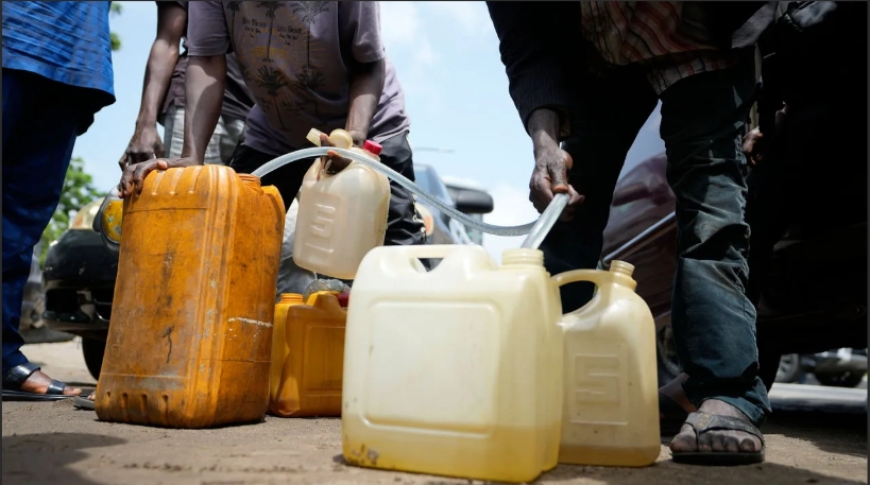Niger Grapples with Severe Petrol Shortage, Turns to Nigeria for Aid Amid Crisis

Since the beginning of March, Niger Republic has faced an unprecedented shortage of petrol, leading to widespread disruptions in the country’s economic activities. Filling stations in Niamey, the capital, and other towns have run out of fuel, leaving residents and businesses struggling to function that’s According to international news outlets Legit.ng,.
For years, Niger has relied heavily on fuel imports from Nigeria, with approximately 50% of its petrol needs met through smuggling routes. Despite recent diplomatic tensions between the two countries, Nigeria has continued to provide essential fuel aid to Niger, which is now in the midst of a severe fuel crisis.
Diplomatic Efforts and Fuel Aid
Reports suggest that a high-ranking delegation from Niger’s military government recently visited Abuja to discuss the fuel shortage with Nigerian officials. As a result of these talks, Nigeria has agreed to supply Niger with 300 truckloads of Premium Motor Spirit (PMS), a critical move aimed at resolving the fuel crisis while also serving as leverage in ongoing negotiations with Niger.
Sources indicate that Niger’s previous fuel supplier, a Chinese refinery, has ceased operations due to unresolved supplier issues, leaving the country with limited options. In light of this, Niger approached Nigeria for assistance as its fuel shortage reached critical levels. However, the exact terms of the fuel aid remain undisclosed.
A senior Nigerian government official confirmed that the fuel supply was intended as a strategic move to encourage Niger’s return to the Economic Community of West African States (ECOWAS). “By providing them with essential resources, we believe Niger will eventually rejoin ECOWAS, as they lack the capacity to import sufficient food for their population,” the source stated.
Rising Fuel Prices and Border Impact
The fuel crisis in Niger has led to astronomical petrol prices, with reports of prices reaching N8,000 per liter in some areas. In border towns of Nigeria’s Sokoto State, fuel prices range from N2,500 per liter to N8,750 per liter, depending on the proximity to Niger. Businessmen, including Mallam Abubakar Usman, have noted the severe scarcity, attributing it to the strained relations between the two countries.
Niger’s ongoing fuel crisis has been worsened by a dispute between the ruling junta and Chinese oil companies. This conflict escalated in March 2024 when the China National Petroleum Corporation (CNPC) provided Niger with a $400 million advance, secured against future crude oil deliveries. However, after Niger struggled to repay the debt, tensions mounted, culminating in the expulsion of Chinese oil executives and the freezing of accounts at Niger’s Soraz refinery.
The Collapse of Niger’s Petroleum Sector
As a result of the escalating conflict, the Soraz refinery, a crucial fuel source for the country, ceased operations, further deepening the fuel shortage. The military junta’s imposition of an $80 billion tax on Soraz, in addition to an existing debt of $250 billion owed to the state-owned Sonidep, led to the collapse of the refinery and the nation’s petroleum sector.
Maazou Aboubacar, Commercial Director of Sonidep, confirmed that the Soraz refinery could no longer meet domestic demand and that the decline of fuel smuggling from Nigeria had further exacerbated the crisis. The junta’s decision to cut fuel prices also contributed to the rise in consumption, straining available resources.
Nigeria’s Continued Support
Despite accusations from Niger’s Head of State, Brigadier General Abdourahmane Tchiani, regarding Nigeria’s alleged collusion with foreign powers, Nigeria has continued to provide essential fuel aid. Zagazola Makama, a security analyst, noted that while fuel shipments from Nigeria have helped ease the crisis, Niger’s state media has avoided acknowledging the source of the fuel.
Oil marketers estimate that the 300 truckloads of fuel supplied by Nigeria amount to around 13.5 million liters. Industry experts, including Hamed Fashola, National Vice President of IPMAN, and Billy Gillis-Harry, National President of PETROAN, confirmed that Nigeria has sufficient fuel reserves to meet both domestic and international needs without causing shortages at home.
What's Your Reaction?









































































